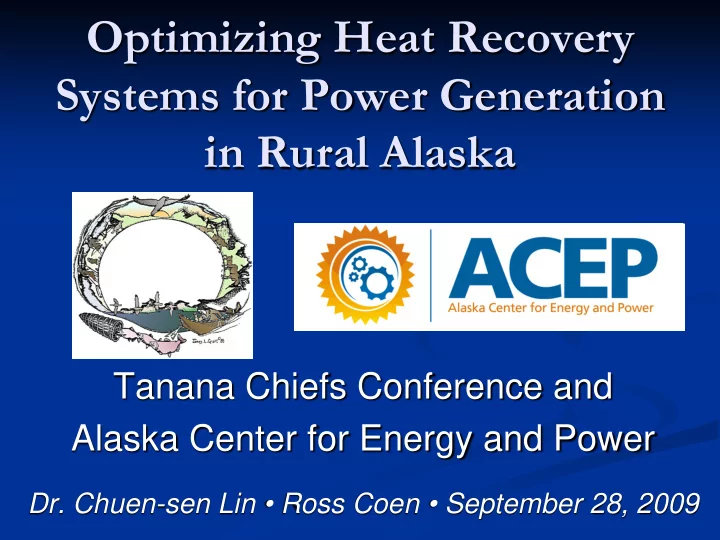

Optimizing Heat Recovery Systems for Power Generation in Rural Alaska Tanana Chiefs Conference and Alaska Center for Energy and Power Dr. Chuen-sen Lin • Ross Coen • September 28, 2009
Chena Hot Springs
Project Summary Power generation through use of an Organic Rankine Cycle (ORC) unit with heat recovery from diesel generator. Laboratory and field tests. Preferred vendor: ElectraTherm.
ORC Technology
Project Objectives To achieve ORC efficiency of 10% and corresponding fuel efficiency by ~3%. Reduced fuel consumption. Lower costs. Reduced greenhouse gas emissions.
Project Objectives To achieve ORC efficiency of 10% and corresponding fuel efficiency by ~3%. Reduced fuel consumption. Lower costs. Reduced greenhouse gas emissions. To evaluate feasibility, operation / maintenance requirements, and economic impact.
Project Objectives To achieve ORC efficiency of 10% and corresponding fuel efficiency by ~3%. Reduced fuel consumption. Lower costs. Reduced greenhouse gas emissions. To evaluate feasibility, operation / maintenance requirements, and economic impact. To develop guidelines for ORC application, particularly in rural Alaska.
Tanana Chiefs Conference
Galena, Alaska ~ 650 people 270 air miles west of Fairbanks Transportation, economic, and government hub of Yukon- Koyukuk sub-region Supply access by barge (river ice-free from mid-May to mid- October); regular air access year-round
Galena, Alaska City Power Plant Fuel consumption (2007) = 574,000 gallons diesel Total fuel cost (574,000gal x $6.50) = $3.73 million Total electric costs (fuel + non- fuel) = $4.69 million Average load = 501 kW Peak load = 1000 kW
Effect of ORC on overall efficiency Starting engine fuel 14.5 14.5 14.5 efficiency (kw-hr/gal) Gal fuel per 1000 kW-hr 68.9655 68.9655 68.9655 Cost per 1000 kW-hr (at $448.28 $448.28 $448.28 $6.50/gal) ORC efficiency 10 9 5 improvement (%) ORC fuel efficiency 1.6675 1.50075 0.83375 improvement (kW-hr/gal) Net fuel efficiency (kW- 16.1675 16.00075 15.33375 hr/gal) Gal fuel per 1000 kW-hr 61.8525 62.4971 65.2156 Cost per 1000 kW-hr (at $402.04 $406.23 $423.90 $6.50/gal) Cost savings $46.24 $42.05 $24.38
Potential total cost savings ORC efficiency 10 9 5 improvement (%) Cost savings per $46.24 $42.05 $24.38 1000 kW-hr/gal In 2007, the approximate electric production in Galena was 4,387,284 kW-hr. Potential annual savings $202,868 $184,485 $106,961 with ORC
Economic analysis (payback time) Cost of ORC unit = $128,000 Fuel efficiency = 14 kW-hr/gal, Operation = 24 hr/day
Potential Economic Impact… ACROSS RURAL ALASKA: Electric power generation in rural Alaska in 2007 = 375,000 MW-hr Fuel consumption = 26 million gallons With ORC operating at 10% efficiency, total potential savings in 2007 = $17,340,000 With ORC in every village over 20 years = $346,800,000
Current Status of ORC for Mid-sized engines Power capacity: Less than 100 kW Development status: R&D and prototype (pre- commercial) Efficiency of prototypes: 7% from jacket coolant / exhaust gas recirculation 12.5% from jacket coolant / exhaust of long-haul truck 9% from hot coolant Now is the right time for a small-scale field test in Alaska!
Relevance to Alaska ORC technology is currently being used in large- scale and industrial applications around the world…however… Few data exist on small-scale applications, especially in Alaska’s unique environmental and climatic conditions. There is a need for laboratory / field performance data for optimal application and design improvement.
A successful ORC project has the potential… • To provide data and insight on small- to mid- scale ORC applications.
A successful ORC project has the potential… • To provide data and insight on small- to mid- scale ORC applications. • To reduce fuel consumption and greenhouse gas emissions.
A successful ORC project has the potential… • To provide data and insight on small- to mid- scale ORC applications. • To reduce fuel consumption and greenhouse gas emissions. • To be replicated in other villages in rural Alaska.
Tanana Chiefs Conference Alaska Center for Energy and Power
Recommend
More recommend